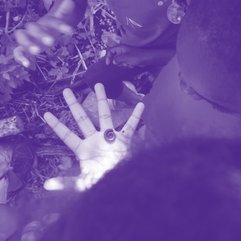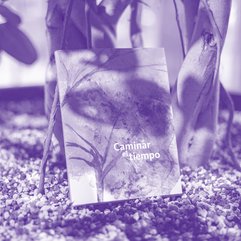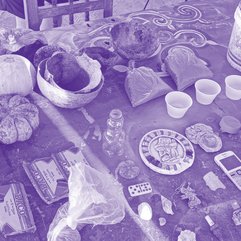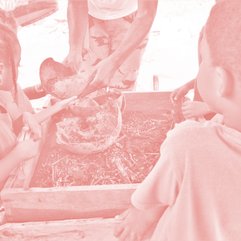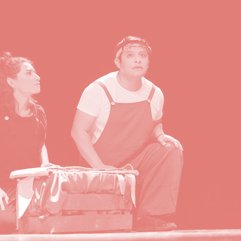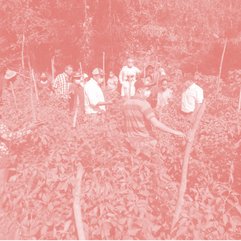How to catch a cloud and take it home?
A workshop for kids and womxn* they relate to.
14.00-17.00
Save the Date
all ages welcome
in German/in English/in Arabic

Water gathering has always been an act of community and solidarity, predominantly between womxn of indigenous communities, and between the womxn and the sources of water themselves. Whether this is through rain dance rituals, songs surrounding springs, the appeasing of river spirits or the collective harvesting of clouds - water ties communities together.
In this workshop, we will harvest clouds. Cloud-catching has resurfaced as a technology to harvest water from the skies, in areas where it is most scarce on the soil. From North Africa to Latin America, the suspended clouds are softly gathered in droplets to quench the earth.
In this workshop, we look into the various ways that we, as an intergenerational group of womxn* and children, come together to summon the clouds. We will gather around a cauldron of water, and print the clouds onto fabric, while exchanging our own stories of water solidarity. Our painted fabrics will then be used to weave a large cloud-catching structure in the gardens of Spore, that will continue to catch the threads of our stories that tie us together as communities. Throughout, we will continually ask ourselves how the soft ephemeral and intangible quality of clouds, like our stories, bind us together.
Alia Mossallam holds a PhD in Political Science. Her dissertation explores a popular history of Nasserist Egypt through stories told and songs sung by people behind the 1952 revolution.
She has taught at the American University in Cairo (AUC), the Cairo Institute for Liberal Arts and Sciences (CILAS), and holds the series of workshops ‘Reclaiming Revolutionary Histories’ with students, activists and artists in governorates all over Egypt, an experiment in history-telling. In the spirit of making histories more accessible, she also worked – e.g. in the case of the play Hawwa al-Hureyya (Whims of Freedom) – with a number of theatre practitioners to document revolutionary experiences of the present, explore alternative histories of the past, and recreate them on stage. She continues to look for these stories and songs in an attempt to recover and document a lost history of popular movement in Egypt.
Ingrid Hora (born 1976, Bolzano, South Tyrol) is an italian artist who lives and works in Berlin, Germany. Through a multidisciplinary artistic production, Hora stages experiments on socio-political conditions examining i.e. the common action of a collective in an altered context. At the same time,she poses the question of the extent to which acting in constantly reshaping interconnected, interactive networks is a fundamental and integral part of the human being, or whether in our age of individualism we have already forgotten the ability to act flexibly together.





